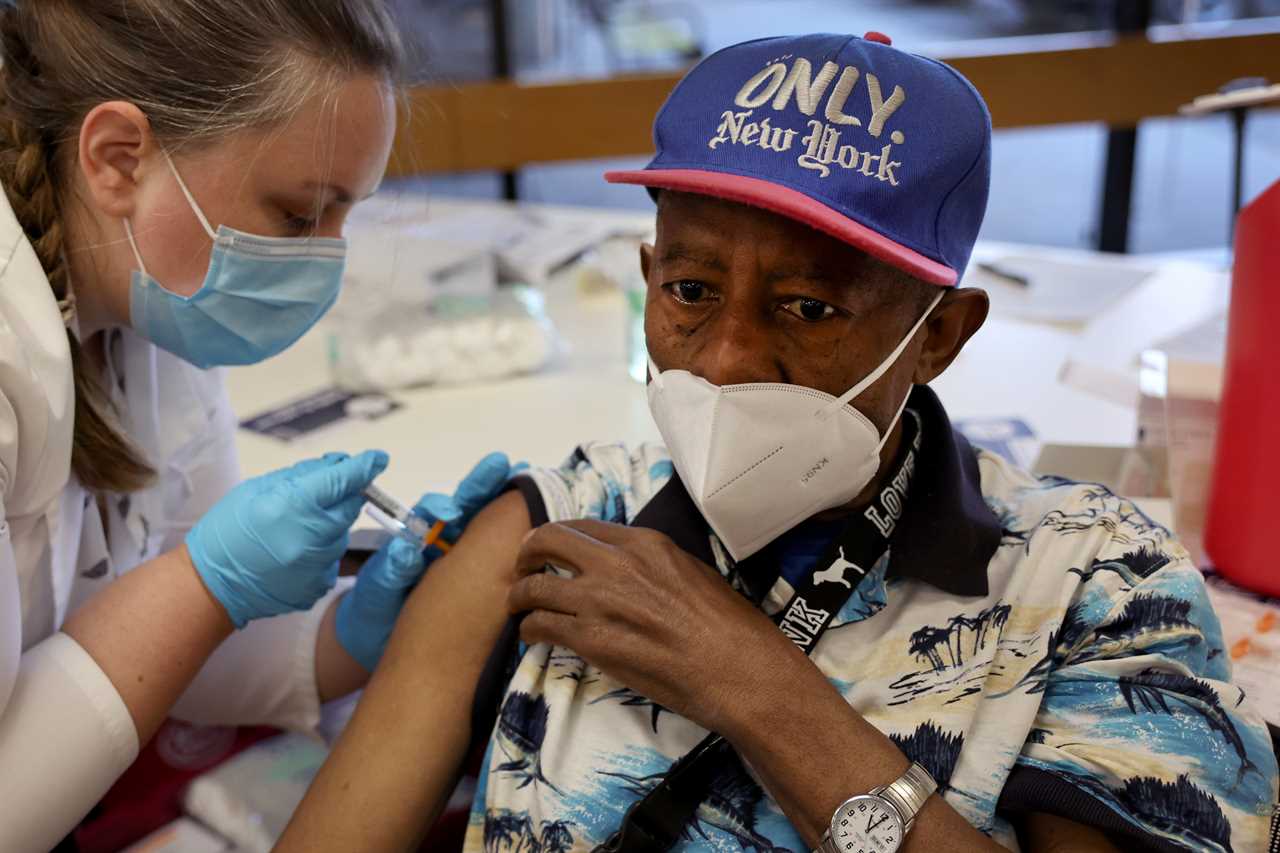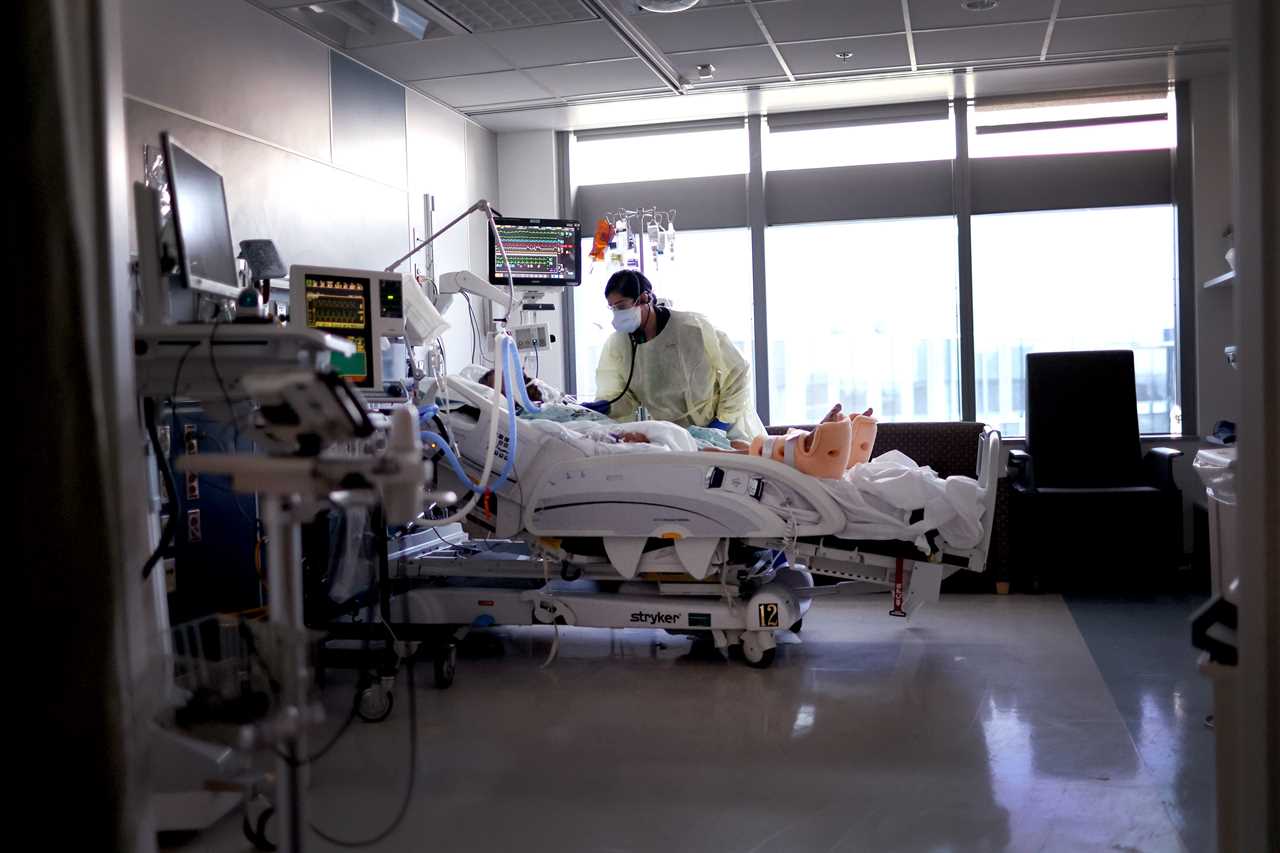
State health officials are warning people that time is running out to get vaccinated before gathering with family over the holidays as Covid-19 cases surge nationwide alongside unseasonably severe waves of flu and respiratory syncytial virus.
The guidance comes after two excruciating holiday seasons that sent Covid-19 cases and deaths skyrocketing. And it underscores the ongoing struggle of public health officials at the state and federal level to get Americans vaccinated against the flu and Covid.
While public health experts say this winter’s Covid-19 surge may be more mild, they worry whether hospitals — already dealing with staffing shortages — can handle the increased caseload from Covid on top of the strain they’re experiencing with RSV and the flu.
Nearly 30,000 people currently in the hospital have tested positive for Covid-19, according to the CDC, up 30 percent since Thanksgiving — with New York, Arizona and New Mexico among the hardest hit.
“The situation in the hospitals is grim,” said David Scrase, secretary of the New Mexico Health and Human Services Department. “The death toll from this very serious virus continues to go up and really, hopefully, will create a sense of urgency in individuals and families to think about getting access to vaccines and also to treatments, should you test positive for coronavirus.”
A little more than 13 percent of Americans over the age of 5 have gotten their updated booster vaccine since it was released in September — including about a third of seniors, the group most susceptible to hospitalization, according to the CDC. Case counts in nursing homes are also up more than 30 percent since Thanksgiving.
And while the Omicron subvariants currently circulating are less lethal than previous variants, about 426 people are dying, on average, from Covid-19 each day — a nearly 62 percent increase from last week, according to the CDC.
“Most of the population — unfortunately — has forgotten about Covid-19 and moved on. As a result, we’re seeing a rise in cases and a rise in hospitalizations, and that worries me,” said Ali Mokdad, professor of global health at the Institute for Health Metrics and Evaluation at the University of Washington. “Right now with the rise of flu, RSV and Covid, our health professionals are exhausted.”
In Louisiana, state health officials are recommending people consider getting tested before attending holiday gatherings.
In Mississippi, the state is down to 65 ICU beds and is now transferring some patients to other states, though Tennessee and Alabama have stopped taking out-of-state transfers.
In Arizona, hospitals have asked the state for additional resources, such as pediatric cribs.
And in Oregon, Gov. Kate Brown signed an executive order on Wednesday in response to the RSV, flu and Covid-19 outbreaks.

“The situation facing our hospitals is extremely serious,” said Dean Sidelinger, Oregon’s state health officer and state epidemiologist. “Hospitals are overwhelmed and don’t have enough beds to treat everyone in the manner they’re accustomed to.”
Health officials believe RSV may have already hit its peak, but flu and Covid continue to pose major challenges to the health care system. Flu hit early, hard and fast in the Southern Hemisphere this year — a trend some experts believe the Northern Hemisphere is likely to follow — but how hard Covid hits this year remains uncertain.
“These curves are getting steeper each week around flu, Covid-19 and other respiratory viruses,” said California Health and Human Services Agency Secretary Mark Ghaly. “Taken separately, these infections are manageable, but when they all come together, the difficulty posed to the system is pretty extreme — and we’re seeing that now.”
Ghaly said total hospitalizations for Covid-19 and flu in California will likely climb from 6,100 this week to 10,000 by the end of the year or early January.
While health officials are hoping that the level of immunity in the population from infections and vaccination means this winter’s surge won’t be as severe, they remain concerned about the virus’ impact on elderly and immunocompromised people — particularly given the poor uptake of the bivalent booster shot this fall.
“When we break it out in terms of the age groups, it’s the older adults that are having the highest rate of cases and we are seeing an upward trend in hospitalizations,” said Jennifer Dillaha, director of the Arkansas Department of Health. “That’s concerning because usually when hospitalizations go up, then the reported deaths will also later increase.”
The Biden administration recently announced a six-week campaign to boost Covid-19 vaccination rates before the end of the year, and CDC Director Rochelle Walensky warned Monday that rising case and hospitalization numbers are “worrisome” as people prepare to gather together across multiple generations for the holidays.
“If you’re over 65 or 70 and you have underlying health conditions that increase your risk and you haven’t been vaccinated, you are at great risk and you should take every precaution possible,” said Eric Toner, senior associate with the Johns Hopkins Center for Health Security.
But the problem is bigger than just Covid. Only about 26 percent of adults had gotten vaccinated for flu as of the end of October, according to CDC data.
Rachel Herlihy, Colorado’s state epidemiologist, said hospitalization rates for the flu are “pretty unique, severe and early for us compared to other influenza seasons.”
“It’s not just the challenge of Covid-19, it’s influenza and RSV stacked on top of Covid that’s presenting a challenge to our health care system,” she said.
Public health experts say that while flu poses the greatest risk to urgent care facilities and hospital emergency departments, Covid is still a greater threat to ICUs than flu. With the thinning of the health care workforce over the past two years, they said hospitals wouldn’t have the resources to deal with another serious, Delta-like variant that causes more severe disease.
“The triad of diseases now is terrible — but it’s a better situation compared to the peak surges of Covid,” said Irwin Redlener, director of the Pandemic Resource and Response Initiative at Columbia University. “If we hadn’t had Covid before, this would be a very overwhelming winter for doctors, nurses and parents. We’re talking about a very serious uptick in respiratory illnesses in general. Compared to the worst of times with Covid, this is probably better. Compared to a typical winter season, this is significantly worse.”
Even with the coming wave, public health officials say their message hasn’t changed: They’re advising people to wash their hands, get vaccinated, stay home when sick and take extra precautions like testing for Covid or masking up around vulnerable family members.
“This is another year that we probably ought to do Zoom birthdays and Christmases,” said Georges Benjamin, executive director of the American Public Health Association. “If you don’t, then get fully vaccinated, and I think you’re fine. There’s a risk, but I think it’s a reasonable risk and a rational risk. But if you have vulnerable family members, be careful.”
----------------------------------------
By: Megan Messerly
Title: ‘The situation in the hospitals is grim’: States face brutal virus fallout
Sourced From: www.politico.com/news/2022/12/11/hospitals-states-virus-flu-covid-00073346
Published Date: Sun, 11 Dec 2022 07:00:00 EST
Did you miss our previous article...
https://consumernewsnetwork.com/politics-us/why-courts-civil-rights-hero-could-have-opposed-affirmative-action






